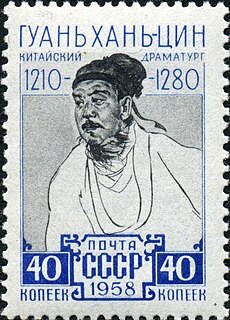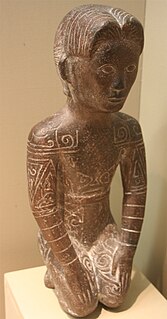This page is based on this
Wikipedia article Text is available under the
CC BY-SA 4.0 license; additional terms may apply.
Images, videos and audio are available under their respective licenses.

Year 247 (CCXLVII) was a common year starting on Friday of the Julian calendar. At the time, it was known as the Year of the Consulship of Philippus and Severus. The denomination 247 for this year has been used since the early medieval period, when the Anno Domini calendar era became the prevalent method in Europe for naming years.

Yue or Yueh is one of the primary branches of Chinese spoken in southern China, particularly the provinces of Guangdong and Guangxi, collectively known as Liangguang.

Guan Hanqing, sobriquet "the Oldman of the Studio", was a notable Chinese playwright and poet in the Yuan Dynasty. He has been described as among the most prolific and highly regarded dramatists of the Yuan period.

Yue Fei, courtesy name Pengju, was a Han Chinese military general who lived during the Southern Song dynasty. His ancestral home was in Xiaoti, Yonghe Village, Tangyin, Xiangzhou, Henan. He is best known for leading Southern Song forces in the wars in the 12th century between Southern Song and the Jurchen-ruled Jin dynasty in northern China before being put to death by the Southern Song government in 1142. He was granted the posthumous name Wumu (武穆) by Emperor Xiaozong in 1169, and later granted the posthumous title King of È (鄂王) by Emperor Ningzong in 1211. Widely seen as a patriot and national folk hero in China, since his death Yue Fei has evolved into a standard epitome of loyalty in Chinese culture.

The Baiyue, Hundred Yue or Yue were various indigenous non-Chinese peoples who inhabited the region stretching along the coastal area from Shandong to southeast China and as far west as the Sichuan Basin between the first millennium BC and the first millennium AD. Meacham (1996:93) notes that, during the Zhou and Han dynasties, the Yue lived in a vast territory from Jiangsu to Yunnan, while Barlow (1997:2) indicates that the Luoyue occupied the southwest Guangxi and northern Vietnam. The Han shu (漢書) describes the lands of Yue as stretching from the regions of Kuaiji (會稽) to Jiaozhi (交趾). In the Warring States period, the word "Yue" referred to the State of Yue in Zhejiang. The later kingdoms of Minyue in Fujian and Nanyue in Guangdong were both considered Yue states.

Emperor Gaozong of Song, personal name Zhao Gou, courtesy name Deji, was the tenth emperor of the Song dynasty in China and the first emperor of the Southern Song dynasty.

The Conquest is a television series based on the conflict between the states of Wu and Yue during the Spring and Autumn period of Chinese history. The series was jointly produced by Hong Kong's TVB and mainland China's CCTV under executive producers Tommy Leung and Raymond Chai. It was renamed to Legend of the Heroic Duo for the mainland China release, where it aired two episodes every night on Zhejiang Satellite TV (ZJSTV) from 6 June to 28 June 2006, totalling 49 episodes. In Hong Kong, The Conquest aired five days a week on the TVB Jade network from 18 December 2006 to 10 February 2007, totalling 42 episodes.
Shen Yue, courtesy name Xiuwen (休文), was a poet, statesman, and historian born in Huzhou, Zhejiang. He served emperors under the Liu Song Dynasty, the Southern Qi Dynasty, and the Liang Dynasty.

Zhou Tong was the archery teacher and second military arts tutor of famous Song Dynasty general Yue Fei. Originally a local hero from Henan, he was hired to continue Yue Fei's military training in archery after the boy had rapidly mastered spearplay under his first teacher. In addition to the future general, Zhou accepted other children as archery pupils. During his tutelage, Zhou taught the children all of his skills and even rewarded Yue with his two favorite bows because he was his best pupil. After Zhou's death, Yue would regularly visit his tomb twice a month and perform unorthodox sacrifices that far surpassed that done for even beloved tutors. Yue later taught what he had learned from Zhou to his soldiers and they were successful in battle.

Taiwan competed at the 1968 Summer Olympics in Mexico City, Mexico. 43 competitors, 35 men and 8 women, took part in 57 events in 8 sports.
The Wu Chinese people, also known as Wuyue people, Jiang-Zhe people (江浙民系) or San Kiang (三江) are a major subgroup of the Han Chinese. They are a Wu Chinese-speaking people who hail from southern Jiangsu province, the entirety of the city of Shanghai and all of Zhejiang province, as well as smaller populations in Xuancheng prefecture-level city in southern Anhui province, Shangrao, Guangfeng and Yushan counties of northeastern Jiangxi province, and some parts of Pucheng county in northern Fujian province.
The History of Song or Song Shi is one of the official Chinese historical works known as the Twenty-Four Histories of China that records the history of the Song dynasty (960–1279). It was commissioned in 1343 and compiled under the direction of First Minister Toqto'a and Prime Minister Alutu (阿鲁图/阿魯圖) during the Yuan dynasty (1279–1368) at the same time as the History of Liao and the History of Jin. Running to a total of 496 chapters, the History of Song includes biographies of the Song Emperors along with contemporary records and biographical sketches of Song dynasty politicians, soldiers and philosophers.
The associations of good-doing are organised groups of the indigenous religion of Hebei province, or the "Pear Area" of China. The Congregation of the Dragon's Name is one of these movements of good-doers.
Yue "Jennifer" Wu is a Chinese American table tennis player originally from China who has been named to the U.S. team at the 2016 Summer Olympics. She was a gold medalist in women's team and women's singles at the 2015 Pan American Games, which qualified her for the 2016 Olympic Games.








